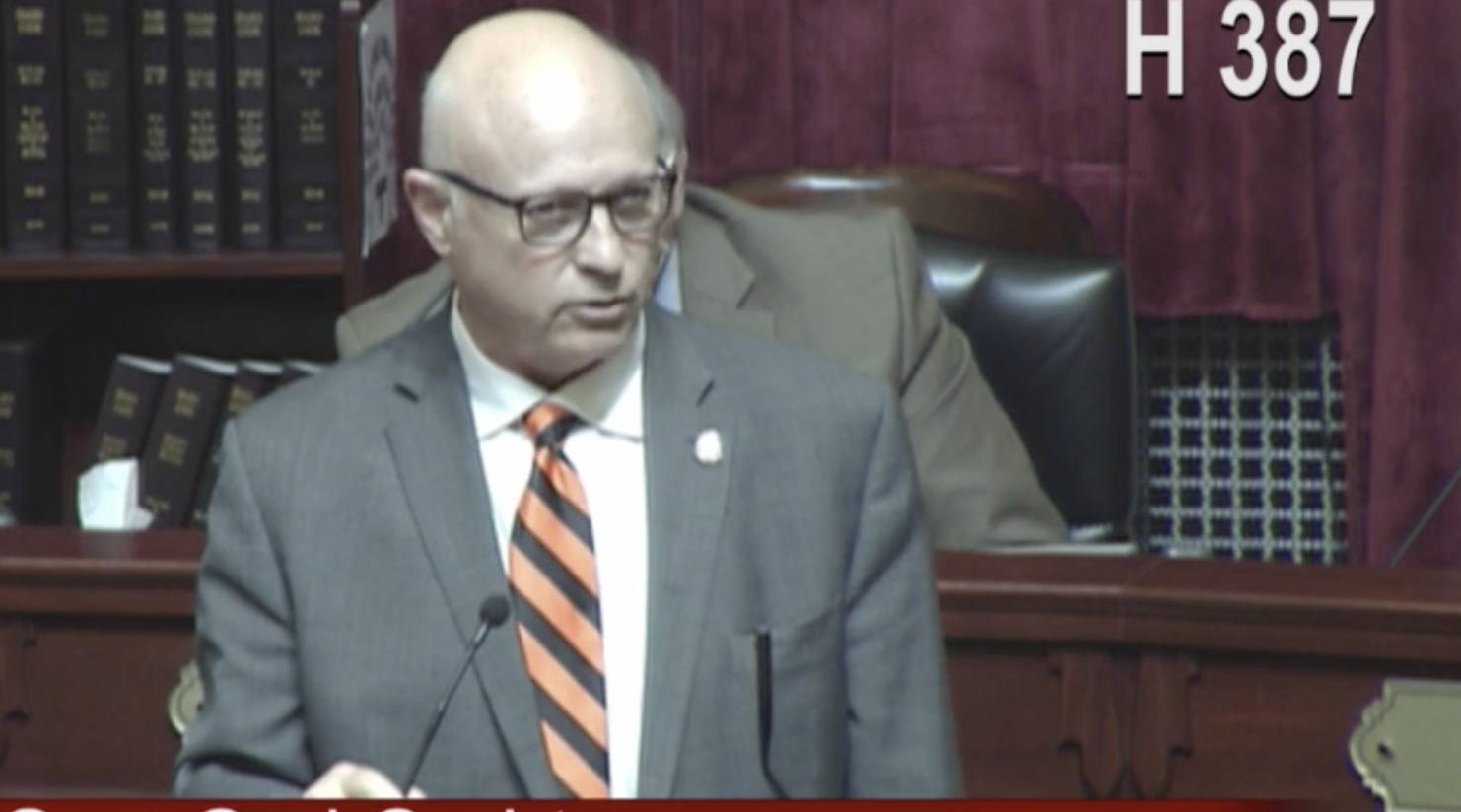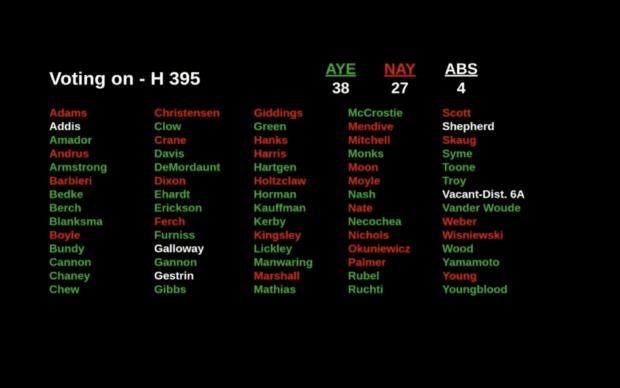On the 114th day of the 2021 legislative session, the education budget debates effectively came to a conclusion.
On Tuesday afternoon, the Senate approved the biggest education budgets on their docket — a K-12 teacher salaries bill and a reduced higher education budget. Both of these bills passed the House Monday, which means both are on their way to Gov. Brad Little’s desk.
Tuesday’s votes bring legislators a bit closer to wrapping up the 2021 legislative session, already the third longest in state history. But lawmakers continue to wrestle several unresolved issues outside the education arena — property tax relief, federal funding for child care centers and legislative and gubernatorial powers in an emergency. All three of these issues punctuated the Statehouse calendar on Tuesday.
Here’s a look at the Senate’s education votes.
Higher education. Once again, the Senate easily passed a budget funding the state’s four-year schools. But not without debate that adhered largely to party lines.

And the debate focused on $2.5 million in cuts in House Bill 387 — which earmarks $313.1 million in tax dollars and $629.9 million in overall funding to higher education.
The cuts — $1.5 million to Boise State University, $500,000 to the University of Idaho and $500,000 to Idaho State University — are designed to “send a message” about campus social justice programs, said Sen. Carl Crabtree, R-Grangeville, the budget bill’s sponsor.
Democrats railed against the cuts, and decried the message the Legislature was sending to the schools and their students.
“I’m not proud of that at all,” said Sen. Melissa Wintrow, D-Boise. “I don’t want any part of that.”
Sen. Grant Burgoyne, D-Boise, noted that the first version of the higher education budget included only a $409,000 cut to Boise State, designed to cover the cost of social justice programs. He said the Senate was being bullied and snookered into accepting a deeper and arbitrary round of cuts.
“Now we’re presented with another deal … by people who seem to have a hard time keeping deals,” said Burgoyne.
Senate Education Chairman Steven Thayn debated for the bill, and pushed back against the idea that indoctrination doesn’t occur on campus. Thayn discussed his own experience as a Boise State student, dating back to 1978, saying he was ridiculed and given failing grades for espousing conservative beliefs.
“Every once in a while, we need to make a statement,” said Thayn, R-Emmett. “And I think this is what this bill does.”
The higher ed budget debate comes days after legislators made another statement on social issues — passing House Bill 377, designed to curb indoctrination in K-12 and higher education. Little signed HB 377 last week.
With the new law on the books, Tuesday’s roll call took on a different flavor.
The new higher ed bill passed 26-8, almost entirely on party lines. Sen. Christy Zito, R-Hammett, broke ranks to oppose the budget, saying it didn’t go far enough to prevent campus indoctrination. “We still don’t have absolute guarantees that this won’t happen.”
The original higher ed budget passed the Senate on March 17 by a similar, 27-6 vote, with the six no votes coming from Republicans.
Teacher salaries. It didn’t take the Senate long to spend $1.1 billion. The Senate unanimously supported the largest of the seven K-12 budget bills — funding two years of pay increases under the state’s career ladder teacher salary blueprint.
It took weeks for the Senate to get a chance to vote for teacher pay raises. A divided House killed the salary bill on April 13 over indoctrination concerns. On Monday, with HB 377 on the books, the House unanimously approved a rewritten teacher salary bill, setting the stage for Tuesday’s Senate vote.
“This is a bill we’ve all been waiting for,” said Sen. Janie Ward-Engelking, a Boise Democrat and retired teacher. “I know I’ve been.”
Federal stimulus dollars. The Senate followed the House’s lead and gave K-12 schools the go-ahead to spend more than $454 million from the American Rescue Plan Act.
This bill passed 29-2, with Zito and Sen. Regina Bayer, R-Meridian, voting no.
School operations. The Senate unanimously passed a K-12 operations budget. The budget, including more than $702 million of state tax dollars, covers a host of items: salaries for classified employees such as bus drivers and classroom paraprofessionals; transportation; school technology; and discretionary dollars schools can use to cover employee benefits.
Federal money to help day cares, child homelessness gets rapid approval
In what committee leaders said could be their final meeting of the legislative session, the Joint-Finance Appropriations Committee Tuesday OK’d more than $100 million in federal money earmarked for Idaho children, parents and child care facilities. Later that night, the House rapidly approved the group of funding bills.
The Legislature overwhelmingly voted to free up $70 million in federal grants for Idaho child care centers to help stabilize the industry; a $36 million block grant for 5- to 13-year-olds attending day cares and other after-school programs; and nearly $2.9 million to alleviate homelessness among children.
“Not everybody can afford to have somebody come to their home and take care of their children. Not everybody can afford to stay home. And so, it puts our working families in a very difficult position,” said Rep. Caroline Nilsson Troy, R-Genesee, of the block grant, which families could use for tuition and fees at Boys and Girls Clubs, licensed daycares, and other programs.
The votes came amid protests and pressure. Child care providers across the Treasure Valley closed their centers Monday to demonstrate outside the Capitol and call attention to how many people would be affected if Idaho child care facilities continue to disappear, the Idaho Capital Sun reported.
All three budgets passed JFAC 17-2, with Reps. Ron Nate, R-Rexburg, and Priscilla Giddings, R-White Bird voting “no.” But it was at first unclear how they’d fare in the Senate and the House, the latter of which has rejected federal money for preschool grants and school COVID-19 testing this session.
But the House quickly voted to approve the block grant, the funds targeting student homelessness and the stabilization money with little debate Tuesday night. The first two House votes weren’t close, either; the block grant passed 50-15 and the homelessness aid was approved 53-10. The stabilization money, the biggest-ticket item in sheer size, ran into more trouble, but still cleared the House 38-27.
The largest budget sparked testimony from opponents like Rep. Heather Scott, R-Blanchard, who questioned why the child care industry was receiving aid while others, like restaurants, aren’t. But House Bill 395, doling out the grants for providers, is key to helping parents get back to work, backers said; it’s key to “leveraging recovery in other industries,” said Assitant Minority Leader Ilana Rubel, D-Boise.

In JFAC’s meeting: Nate led Tuesday’s opposition, repeating the same point he’s made before voting against an array of federal funding appropriations this year: Federal deficit spending harmfully grows the national debt.
Taking a shot at the student homelessness appropriation, he said, “We already have the funds to meet these needs.”
But committee co-chair Rep. Rick Youngblood, a Nampa Republican, echoed a refrain from lawmakers who have reluctantly approved spending federal money this year: Unspent money, already allocated to the state, won’t go to paying down national debt.
“I had a wonderful conversation last Thursday night with our good Sen. (Jim) Risch, who told me that I could quote him,” Youngblood said. “He said, ‘Rep. Youngblood, the ARPA funds — take them and use them to the best of Idaho’s ability for short- and long-term needs … If you send those dollars back, they will not go into the Treasury, period.’”
Nate retorted, “We should be responsible here and respectfully, if Sen. Risch wants to come and legislate, he can step down and run for legislative office in Idaho and have the voice here that he would then deserve.”
All four members of Idaho’s congressional delegation voted against the American Rescue Plan Act, or ARPA, the latest round of federal relief money approved by Congress. The funding approved Tuesday comes from the stimulus package.
The federal money Nate questioned could be used by students experiencing homelessness and their families to purchase items such as school supplies and eyeglasses. Families could also pay for tutoring and afterschool programs while parents and guardians are at work.
The bulk of the largest appropriation, for child care industry stabilization, would go directly to businesses who have struggled as parents slowly return to work, taking care of their children as they work remotely.
Late in the session, a $6 million early childhood learning grant has been held for weeks on the House floor. The House rejected the grant in March amid concerns about social justice in education.
Kindergarten jump-start bill approved
The House passed a bill that would require that school districts with kindergarten jump-start programs offer a “training program” for parents, encouraging parents to help their students get ready for kindergarten. To participate in a jump-start program, a student’s parents would have to go through that training.
Senate Bill 1075 passed with some resistance, 39-25 as opponents called it a “big government” bill furthering government overreach, but backers pointed out that kindergarten and jump-start programs are optional for Idaho families.
And Rep. Ryan Kerby, R-New Plymouth, said he envisioned the new “trainings” as informal — a teacher stopping by a parent’s house to talk, a dinner with moms and dads or even a phone call. Rep. Julie Yamamoto, a retired school administrator, said that contact with parents is key to helping students in situations where their parents may be incarcerated or live with drug addiction.
Yamamoto, R-Caldwell, asked lawmakers to “listen and try to hear it from somebody else’s point of view,” telling a story of a student whose home situation was improved by teachers engaging with the student’s family early on.
But some, like Rep. Tammy Nichols, questioned if the trainings should be mandatory.
“To me, this seems like we’re trying to legislate good parenting,” Nichols, R-Middleton, said.
Kindergarten jump-start programs are typically four-week sessions offered by school districts to help students gain the developmental skills they need to be ready for kindergarten. Students generally are enrolled in these programs after a screening of their skills shows they’re not ready for kindergarten.
The bill making changes to such programs now heads to the governor’s desk.
Idaho Education News covered some of Tuesday’s hearings remotely.
